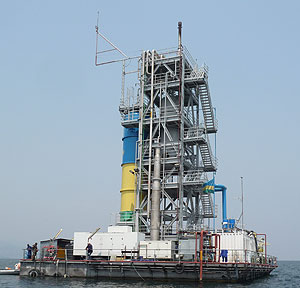Stakeholders to the just concluded Lake Kivu resource exploration meeting agreed to collectively monitor and ensure the sustainable extraction of methane gas from the lake, as well as contribute to the safety of the surrounding population and the environment’s ecosystem.


Stakeholders to the just concluded Lake Kivu resource exploration meeting agreed to collectively monitor and ensure the sustainable extraction of methane gas from the lake, as well as contribute to the safety of the surrounding population and the environment’s ecosystem.
The three-day international workshop on Lake Kivu Resources Development concluded on Thursday in Rubavu District.
During the workshop, the stakeholders assessed the environmental risks associated with the natural set up of L. Kivu and recommended the best technology to extract the gas.
Lake Kivu is one of the African Great Lakes and lies on the border between the Democratic Republic of the Congo and Rwanda.
It contains approximately over 55 billion cubic metres of dissolved methane gas at a depth of 300 metres; however, because Kivu is one of the three known exploding lakes, alongside Cameroon’s Lake Nyos and Lake Monoun, analysts indicate that methane gas extraction may trigger volcanic activity.
In order to exploit L. Kivu in a safe and environmentally friendly way, experts at the workshop established management prescriptions which will be followed as rules and guidelines during the extraction.
"The rules should be respected during the design and operation of methane gas extraction facilities and enforced by a mandated regulatory authority in Rwanda and Congo,” a statement from the workshop read.
"The methane in Lake Kivu is not a retarding bomb, as expressed too many times in the media. First, the gases are efficiently trapped below the depth of 250m and their concentrations are currently too low to produce an eruption”.
Participants stressed that methane exploitation in Lake Kivu is in fact a double win opportunity, whereby, it will both supply energy and delineate the risk of gas eruption.
"Depending on the efficiency of the process, methane extraction could produce as much as 500 to 800 megawatts for 40 years. Then, the exploitation will be reduced to the annual natural recharge of methane in the lake, transforming it into a genuine renewable source of energy,” the stakeholders said.
Earlier this month, the African Development Bank (AfDB), approved a $25m loan to finance phase I of the Lake Kivu gas extraction and power production facility in Rwanda.
Ends


